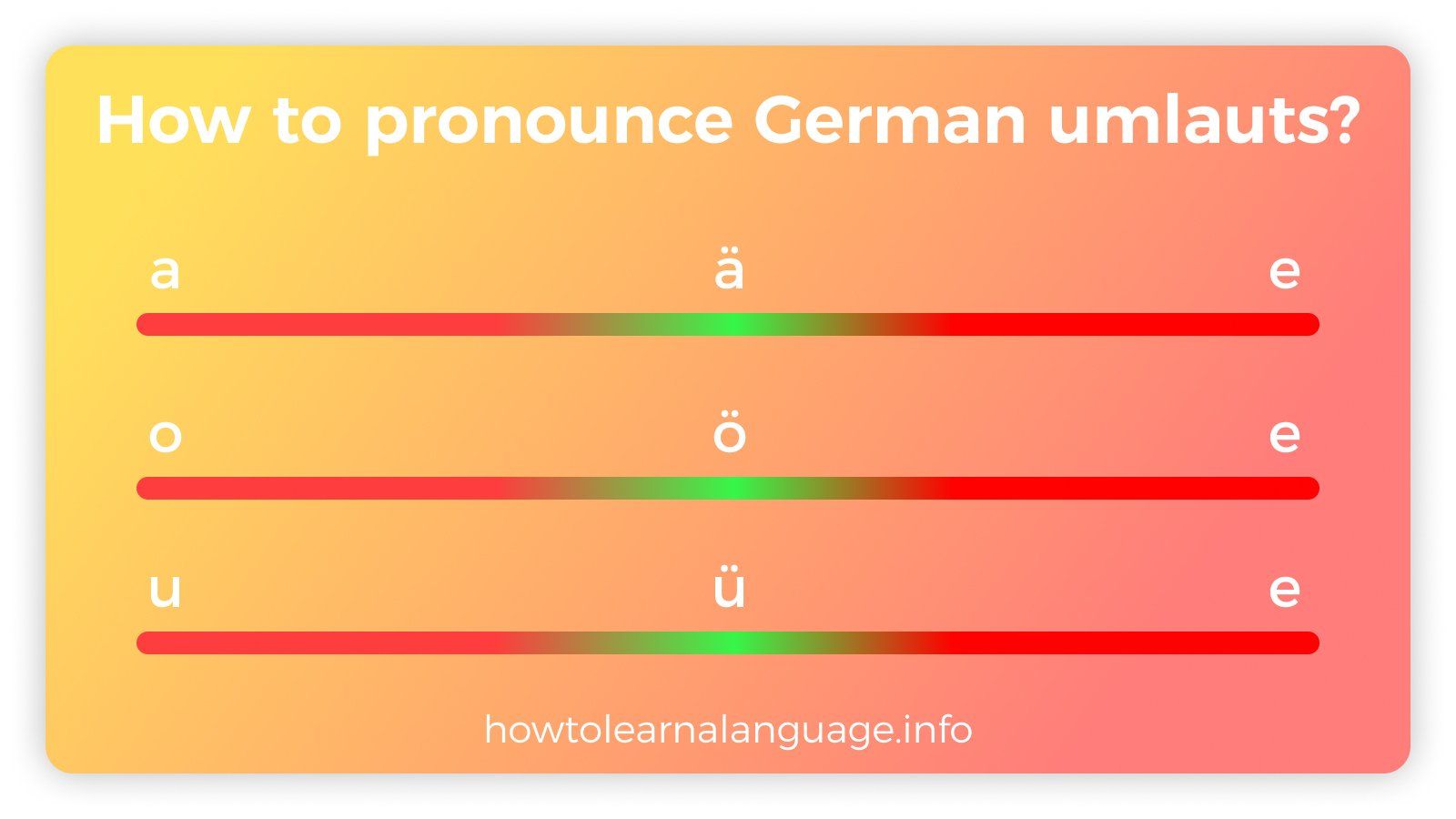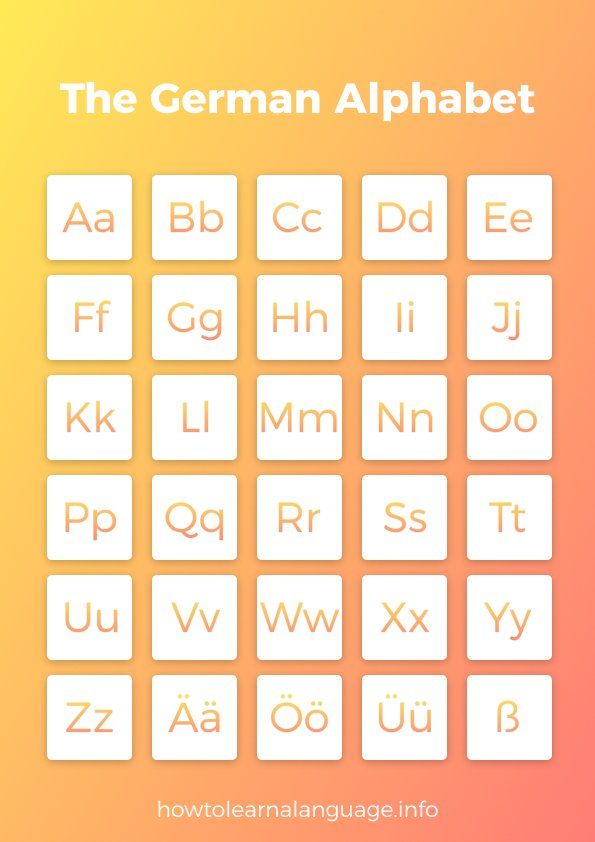German Alphabet from A - Z
The German letters are is similar to the French and English alphabets in terms of the letters used. However, there are a few differences that make the letters from Germany unique. If you are interested in learning German, it is important to become familiar with the German alphabet. You should keep an eye on every vowel, because a vowels like ä or ö are very special to the German language. A vowel like a, o, e is not so difficult to learn. You don't have to learn every word to be successful.
In Germany, the ABC known as "das Alphabet." It consists of 26 letters, just like the English alphabet. However, there are a few differences in the spelling a word and sounds of the letters.
Learning the German alphabet can be challenging, especially for those who are not familiar with the French or German languages. One of the main differences is the use of umlauts (ä, ö, and ü) and the sharp s (ß). These letters are not used in French or English and can take some time to get used to.
One important thing to keep in mind is that the vowels in Germany have different sounds than in English or French. There are five vowel sounds in German: a, e, i, o, and u. These sounds are used in many German words, and it is important to learn the proper pronunciation of each vowel.
Spelling is also important when learning German. The spelling of German words can be tricky, especially for those who are not used to the sound of language of Germany. However, with practice, you can become more familiar with the spelling and pronunciation of German words and you will learn it more easily.
Overall, it is used in many words and sounds that are different from English and French. It is important to take the time to learn the alphabet and the pronunciation of each word, not every word of course, to improve your German language skills.
The German language, like many other languages, is built on an alphabet system. However, the German alphabet, also known as the "Deutsche Alphabet," includes a few unique characters that can make it tricky for beginners to master. In this guide, we will go over each letter of the German alphabet in detail, including the proper pronunciation and common words that feature the letter. We will also include helpful tips and tricks for memorization to help you master the German alphabet quickly and easily.
If you need help with learning German and it's necessary for you to be able to speak German in a short time, I recommend taking private German lessons.
Table of contents
We show you the German letters with umlauts and give you sound examples so that you learn the correct pronunciation of each letter.
Play the pronunciation of a letter and then repeat it. Repeat a few times until you think it sounds good. It also helps a lot to record yourself speaking. The most difficult ones are the special vowels also called umlauts. We give you more tips in our video. It is a huge advantage to get used to the sound of the letters, so you automatically improve your spelling.
Remember: Capital letters are used at the beginning of a sentence, for nouns, names or brand names.
How many letters does the alphabet have?
The German 26 letters from the Latin alphabet + 4 special letters. The German language has three special letters called 'umlauts' or in German 'Umlaute'. The three umlauts are: ä, ö, and ü. And the last special letter is the 'Esszet' which looks like this: ß.
In which countries do we use the German alphabet?
The German ABC is used in the 'German Sprachraum' (German language area) which are the following Germany, Belqium, Austria, Switzerland, Luxembourg and Liechtenstein.
How to pronounce the German alphabet?
Pronunciation of German letters with English words as examples
| letter | pronunciation |
|---|---|
| A | pronounced like "a" in the English astronaut |
| B | pronounced like "b" in the English bible |
| C | pronounced like "k" or "ts" |
| D | pronounced like "d" the English doll |
| E | pronounced like "e" in the English ten |
| F | pronounced like "f" in the English fly |
| G | pronounced like "g" in the English go |
| H | pronounced like "h" inthe English hello |
| I | pronounced like "ee" in the English bee |
| J | pronounced like "y" in the English you |
| K | pronounced like "k" in the English kind |
| L | pronounced like "l" in the English lemonade |
| M | pronounced like "m" in the English mouse |
| N | pronounced like "n" in the English nice |
| O | pronounced like "o" in the English orange |
| P | pronounced like "p" in the English pear |
| Q | pronounced like "q" in the English quiz |
| R | pronounced like gargeling in your mouth |
| S | pronounced like "s" the English sun, little bit more soft |
| T | pronounced like "t" the English teacher |
| U | pronounced like "oo" the English food |
| V | pronounced like "f" in "food" but sometimes also like "v" like in "vibe" |
| W | pronounced like "v" the English "vase" |
| X | pronounced like "ks" the English Xylophon |
| Y | pronounced like "y" the English yoga |
| Z | pronounced like "ts" the English bits |
| ß | pronounced like "ss" the English kiss |
| Ä | pronounced like "ai" the English air |
What are the vowels of the German alphabet?
The German language has 5 vowels plus 3 'umlauts' which are also vowels.
The 5 standard vowels are like in English: a, e, i, o, u. They have just a little bit different pronunciation. The 3 umlauts look like a, o, u but with two dots. Then it looks like this: ä, ö, ü.

How do you pronounce the German umlaut "ö"?
When you want to pronounce the umlaut "ö" it is important that your mouth is is slightly pointed and rounded, like a circle. When pronouncing the the letter "ö" you will feel a slight tension above and below your lips towards the and below your lips in the direction of your cheeks. When you have reached this state now try to pronounce a German "o", speak it for a long time until you can't breathe anymore. Now try to slowly change from the German "o" to the German "e". Because the "ö" is exactly between "o" and "e". That means exactly, from the change from "o" to "e" the sound of the "ö" is produced.
How do you pronounce the German umlaut "ä"?
The German "ä" is pronounced like the "a" in the English word "air" at the beginning. Another helpful tip is to pronounce the German "a" for a very long time and then slowly switch to the German "e", This will widen your mouth a bit, and when you change from "a" to "e", you will make exactly the sound you need for the "ä".
How to pronounce the German umlaut "ü"?
You can easily pronounce the German "ü" by slowly transitioning from the German "u" to the German "e". Try to pronounce the "u" as long as possible and slowly change to the "e". Your mouth must be should be shaped as if you were about to give someone a kiss.
Learn the German alphabet with a song
This song for the German alphabet also includes the special letters like ü, ä and ö. But unfortunately not the "ß". But still it can help you to remember how to pronounce the German letters.
German letter chart as PDF Download
Other helpful links for learning German
Omniglot - German language

